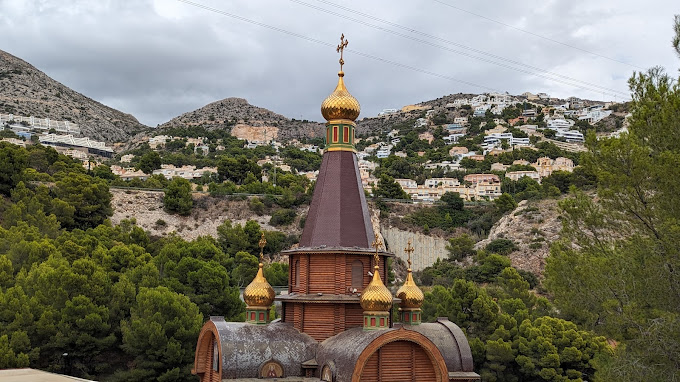Nestled in the picturesque town of Altea on Spain’s Costa Blanca, the Orthodox Church stands as a testament to the rich tapestry of cultural and spiritual influences that shape this region. Known for its stunning dome and traditional Byzantine architecture, the church is not only a place of worship but also a symbol of the enduring Orthodox Christian tradition in a predominantly Catholic country. This article explores the history, architecture, cultural significance, and community impact of the Orthodox Church in Altea.
Historical Background
Altea, with its cobblestone streets and whitewashed houses, has long been a melting pot of various religious and cultural influences. The Orthodox Church in Altea, officially known as the Parish of the Holy Apostles, was established to serve the growing Russian community in the region, alongside other Orthodox Christians from Eastern Europe and beyond. This establishment reflects the broader trends of migration and the spread of Orthodox Christianity into Western Europe in the late 20th and early 21st centuries.
The church was consecrated in the early 2000s, following a significant influx of Orthodox believers to the area. Many were drawn by the region’s beauty and the vibrant expatriate community, finding in Altea a new home to preserve and practice their faith. The construction of the church was spearheaded by the local Orthodox community with support from both Spanish locals and international donors, symbolizing a bridge between different cultures and traditions.
Architectural Significance
The architecture of the Orthodox Church in Altea is a marvel of Byzantine artistry adapted to modern needs and local aesthetics. The building is crowned with a prominent gold dome that sparkles under the Mediterranean sun, visible from many parts of the town and serving as a landmark to both locals and visitors. The exterior is characterized by its simplicity and elegance, typical of Orthodox ecclesiastical buildings, with white walls that reflect the region’s traditional architectural style.
Inside, the church is adorned with iconography typical of Orthodox tradition. The icons, often created by artists from the Orthodox community, depict various saints and scenes from the Bible, rich in color and detail. The iconostasis—a wall of icons and religious paintings separating the nave from the sanctuary—is particularly impressive, featuring intricate carvings and gold leaf that draw the eye and uplift the spirit.
Cultural Impact
The Orthodox Church in Altea serves not only as a religious center but also as a cultural hub for the Orthodox community in the region. It hosts a variety of cultural events, including music concerts, art exhibitions, and lectures on Orthodox theology and history. These events are open to the public and aim to foster a better understanding and appreciation of Orthodox culture among the wider Spanish and international communities in Altea.
The church also plays a crucial role in the celebration of Orthodox religious festivals, which attract believers from all over Spain and abroad. These events, such as Easter (Pascha), Christmas (celebrated on January 7th according to the Julian calendar), and the feast days of various saints, are conducted with traditional liturgical practices that are both solemn and vibrant. The celebrations are often accompanied by community gatherings, traditional food, and a warm welcome to all, regardless of their religious background.
Community Services and Impact
Beyond its religious and cultural functions, the Orthodox Church in Altea is deeply committed to community service and social outreach. It operates several charity programs, including food distribution drives for the needy, support services for immigrants, and educational programs for children. These initiatives are often carried out in collaboration with other religious and secular organizations, reflecting the church’s commitment to living out its faith through practical acts of love and kindness.
The church also provides spiritual counseling and support, offering a sanctuary of peace and contemplation for those seeking solace and guidance. Its doors are open to everyone, embodying the Orthodox Christian ideal of hospitality and inclusiveness.
Conclusion
The Orthodox Church in Altea is more than just a place of worship; it is a vibrant community center and a beacon of tradition and spirituality. It stands as a symbol of the enduring presence of Orthodox Christianity in Spain, bridging cultural divides and fostering a spirit of unity and mutual respect among different communities. As Altea continues to evolve as a cosmopolitan hub, the Orthodox Church remains a vital part of its cultural and spiritual landscape, preserving the heritage of its members while embracing the diversity of its wider community. Through its stunning architecture, rich cultural offerings, and commitment to community service, the church not only enriches the lives of its congregation but also enhances the multicultural tapestry of Altea itself.
Frequently Asked Questions (FAQs)
What is the Orthodox Church in Altea known for?
The Orthodox Church in Altea is renowned for its stunning Byzantine architecture, including a prominent gold dome, and serves as both a spiritual and cultural hub for the Orthodox community and the broader public
When was the Orthodox Church in Altea established?
The church was established in the early 2000s to cater to the growing Orthodox Christian community in Altea, consisting mainly of Russian expatriates and other Eastern Europeans
What cultural events does the Orthodox Church in Altea host?
The church hosts a variety of cultural events, such as music concerts, art exhibitions, and theological lectures, aiming to promote understanding of Orthodox traditions among the wider community
How does the Orthodox Church in Altea participate in community service?
The church runs several community service programs including food distribution drives, support services for immigrants, and educational programs, often collaborating with other organizations
Can non-Orthodox visitors attend services at the Orthodox Church in Altea?
Yes, the church welcomes all visitors, regardless of their religious background, to participate in services and community events, embodying the Orthodox Christian ideal of hospitality
